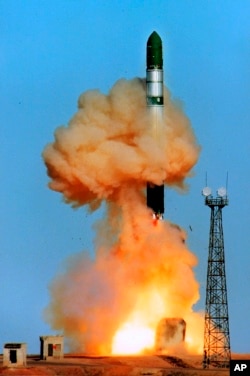MOSCOW —
Russia will begin deploying a new type of long-range missile in 2018 to replace a Cold War standby known in the West as “Satan”, a military commander said on Tuesday in a signal to the United States that Moscow is improving its nuclear arsenal.
A new Intercontinental Ballistic Missile (ICBM) called the Sarmat is being developed to supplant the RS-20B Voyevoda, the Interfax news agency quoted the commander of Russia's Strategic Rocket Forces, General Sergei Karakayev, as saying.
“We are counting on being armed with this qualitatively new missile system ... by 2018-2020,” he was quoted as saying.
The Voyevoda, whose NATO name is the SS-18 Satan, was developed in the 1970s and the missiles are approaching the end of their service life. Karakayev said some of the ICBMs would remain in service until 2022.
The commander spoke on the anniversary of the creation in 1959 of the Strategic Rocket Forces, the military branch in charge of the ICBMs that were the stuff of nightmares in the United States during the superpower standoff of the Soviet era.
Russia and the United States signed the latest of a series of treaties restricting the numbers of ICBMs in 2010, but Moscow has indicated it will not go further in the near future, citing what it says are potential threats from U.S. weapons systems.
President Vladimir Putin has emphasized that Russia must maintain a strong nuclear deterrent, in part because of an anti-missile shield the United States is building in Europe and which Moscow says could undermine its security.
A pro-Kremlin newspaper reported on Monday that Moscow has deployed missiles with a range of hundreds of miles in its western exclave of Kaliningrad, alarming the governments of neighboring Poland and the Baltic states.
It was unclear whether the Sarmat was a missile that Russia tested in May 2012 and said should improve Russia's ability to foil missile defense systems. The Defense Ministry did not reveal the name of that missile.
Putin has pledged to spend 23 trillion roubles ($700 billion) by 2020 to upgrade defense, but a crucial strategic missile program separate to the Sarmat has been plagued by problems.
The Bulava missile had been scheduled to enter service in 2012 but several tests have failed, including an unsuccessful launch in September that prompted Defense Minister Sergei Shoigu to order a new set of tests.
($1 = 32.9342 Russian roubles)
A new Intercontinental Ballistic Missile (ICBM) called the Sarmat is being developed to supplant the RS-20B Voyevoda, the Interfax news agency quoted the commander of Russia's Strategic Rocket Forces, General Sergei Karakayev, as saying.
“We are counting on being armed with this qualitatively new missile system ... by 2018-2020,” he was quoted as saying.
The Voyevoda, whose NATO name is the SS-18 Satan, was developed in the 1970s and the missiles are approaching the end of their service life. Karakayev said some of the ICBMs would remain in service until 2022.
The commander spoke on the anniversary of the creation in 1959 of the Strategic Rocket Forces, the military branch in charge of the ICBMs that were the stuff of nightmares in the United States during the superpower standoff of the Soviet era.
Russia and the United States signed the latest of a series of treaties restricting the numbers of ICBMs in 2010, but Moscow has indicated it will not go further in the near future, citing what it says are potential threats from U.S. weapons systems.
President Vladimir Putin has emphasized that Russia must maintain a strong nuclear deterrent, in part because of an anti-missile shield the United States is building in Europe and which Moscow says could undermine its security.
A pro-Kremlin newspaper reported on Monday that Moscow has deployed missiles with a range of hundreds of miles in its western exclave of Kaliningrad, alarming the governments of neighboring Poland and the Baltic states.
It was unclear whether the Sarmat was a missile that Russia tested in May 2012 and said should improve Russia's ability to foil missile defense systems. The Defense Ministry did not reveal the name of that missile.
Putin has pledged to spend 23 trillion roubles ($700 billion) by 2020 to upgrade defense, but a crucial strategic missile program separate to the Sarmat has been plagued by problems.
The Bulava missile had been scheduled to enter service in 2012 but several tests have failed, including an unsuccessful launch in September that prompted Defense Minister Sergei Shoigu to order a new set of tests.
($1 = 32.9342 Russian roubles)





